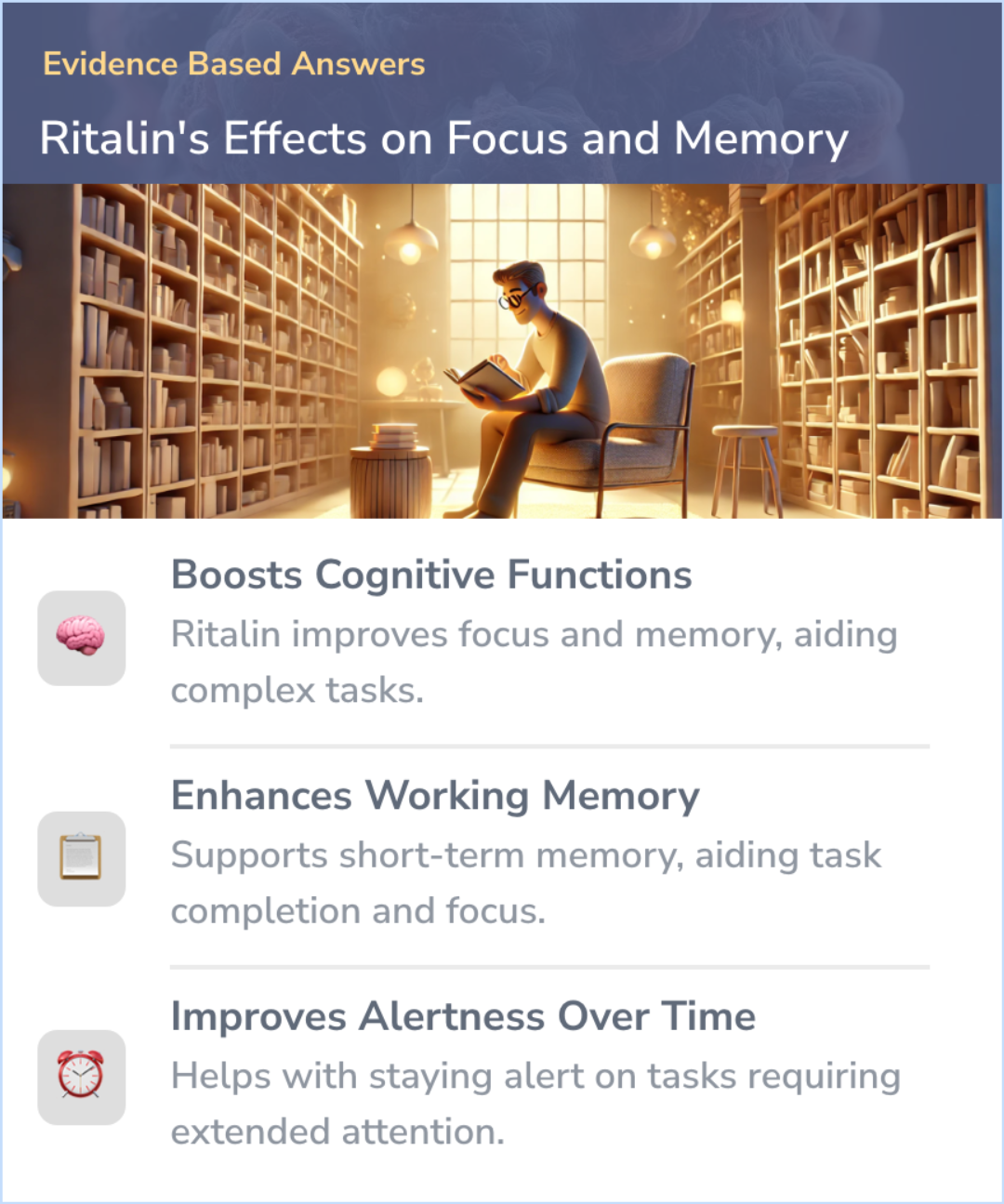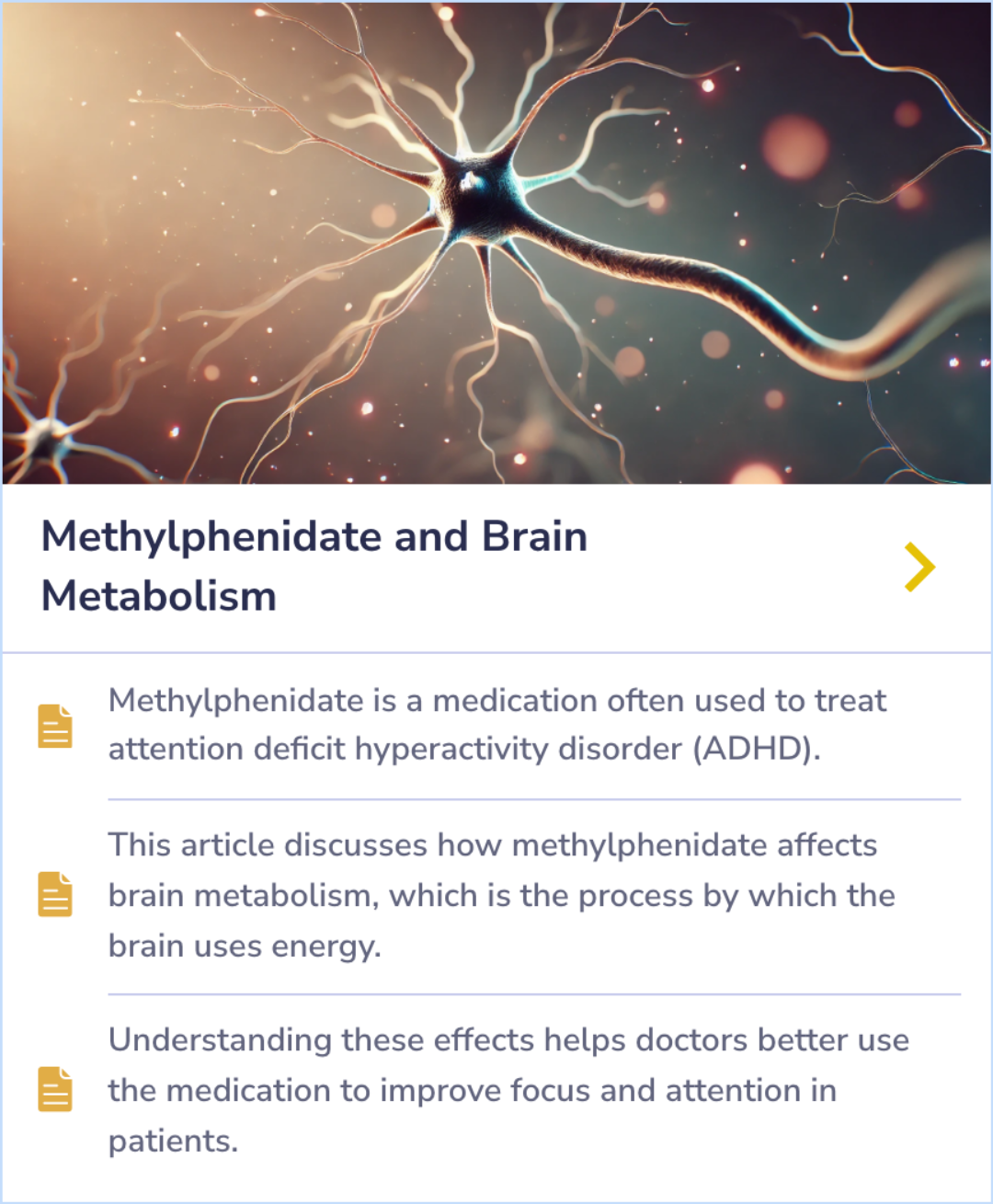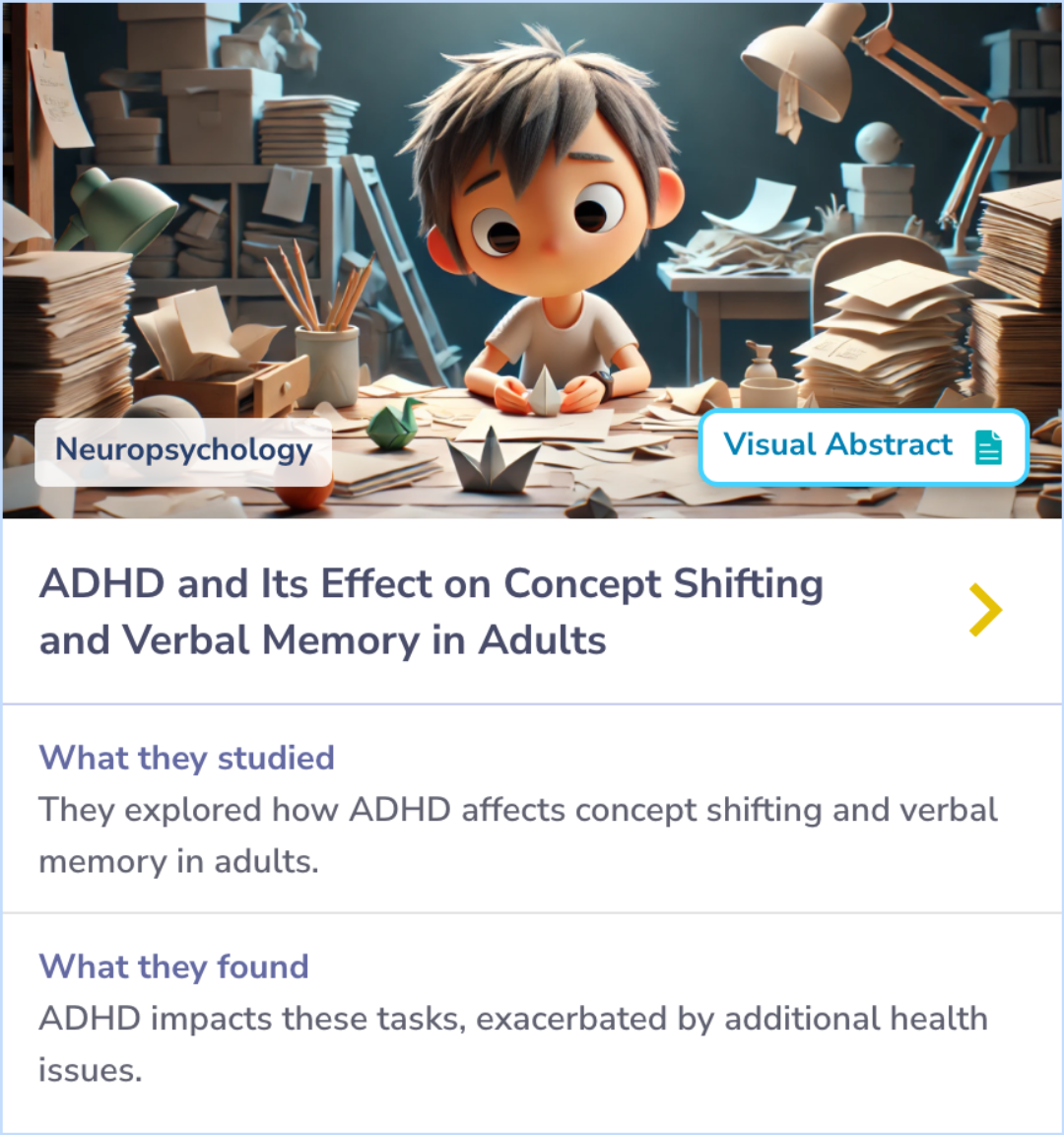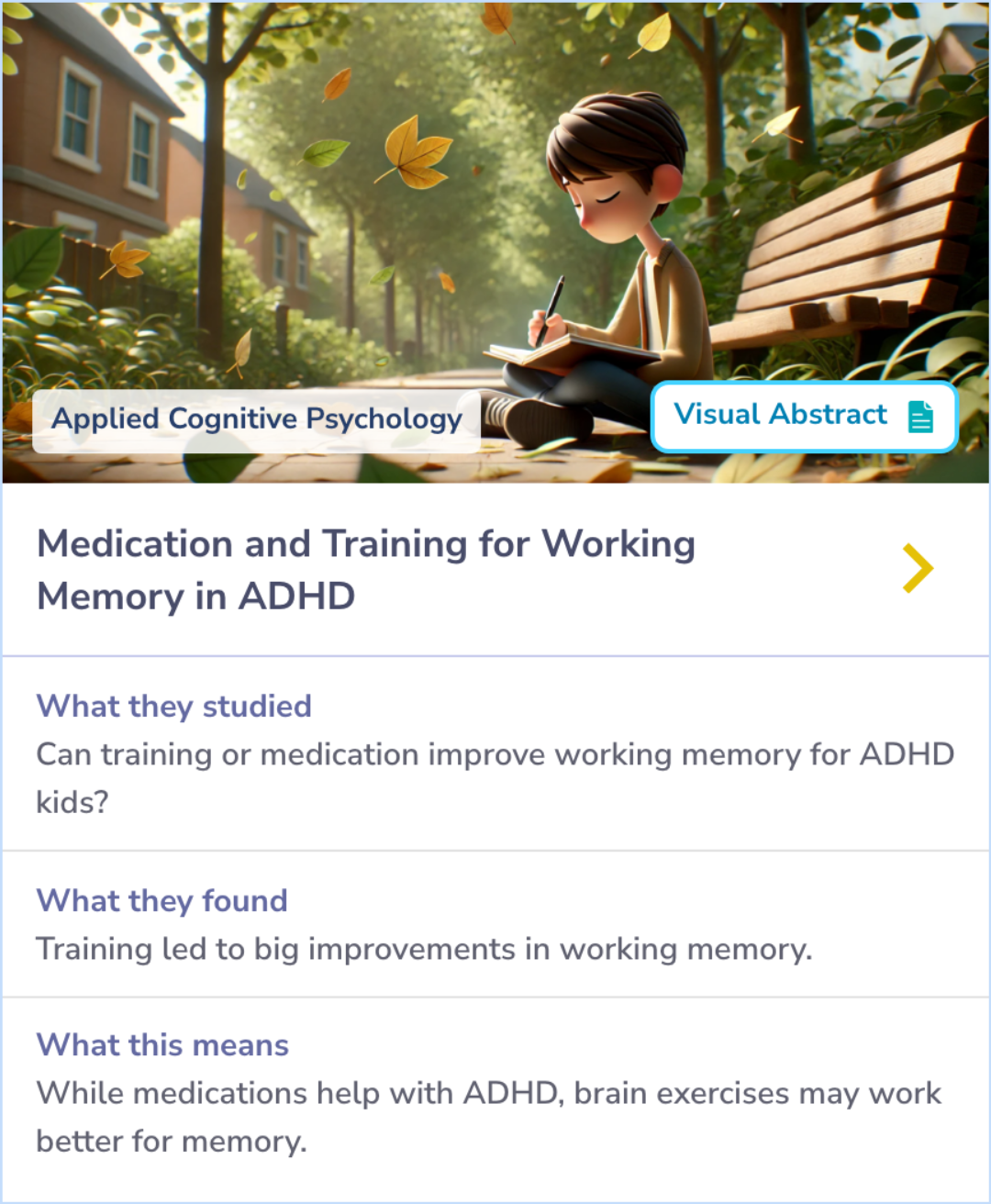Ritalin
Evidence Based Answers
How ritalin affects cognition, vigilance, and memory
Methylphenidate, or Ritalin, improves attention, memory, and alertness by increasing dopamine and norepinephrine, aiding sustained focus and cognitive task performance.
Published: October 25, 2024
Click to explore a section:

Ritalin enhances focus, memory, and sustained alertness through its effects on dopamine and norepinephrine.
Introduction to Methylphenidate (Ritalin)
Methylphenidate, commonly known as Ritalin, is a medication primarily used to treat attention-deficit/hyperactivity disorder (ADHD) and narcolepsy. It is a central nervous system stimulant that affects certain chemicals in the brain, enhancing focus and attention. Methylphenidate works by blocking the reuptake of dopamine and norepinephrine, two neurotransmitters involved in attention and behavior control. This leads to increased levels of these neurotransmitters in the brain, which helps improve symptoms of ADHD.
“
Source Quotes:
Methylphenidate hydrochloride, methyl α-phenyl-2-piperidineacetate hydrochloride USP, is a mild central nervous system (CNS) stimulant.
Methylphenidate binds to the dopamine transporter in the presynaptic cell membrane, blocking reuptake of dopamine and causing a resultant increase in extracellular dopamine levels.
Methylphenidate and Cognitive Improvement
Methylphenidate, commonly known as Ritalin, boosts cognitive functions like attention, working memory, and executive functions. It raises dopamine and norepinephrine levels in the prefrontal cortex, enhancing focus and decision-making. This helps people with ADHD perform better on tasks that require sustained attention and working memory.
Studies show that individuals taking methylphenidate perform better on cognitive tasks due to these effects on neurotransmitter levels.
Studies show that individuals taking methylphenidate perform better on cognitive tasks due to these effects on neurotransmitter levels.
“
Source Quotes:
Methylphenidate was identified as a psychostimulant already in 1954...assumed that antagonism against the dopamine (DA) and noradrenaline (NA) transporters (DAT and NAT, respectively) plays the pivotal role.
Methylphenidate enhances cognitive performance in adults and children diagnosed with ADHD, and also in human volunteers, on tasks that are sensitive to frontal lobe damage.
Methylphenidate's Effect on Memory
Memory, especially working memory, improves with methylphenidate use. By increasing dopamine levels in the prefrontal cortex, it helps the brain store and manipulate information for short periods. This helps people with ADHD manage tasks that involve holding information while performing other activities, like following multi-step instructions or solving complex problems.
“
Source Quotes:
Methylphenidate improves memory, attention and planning, and motor steadiness...The exact mechanisms of the cognitive impairment in ADHD are not well understood but it is believed that the clinical efficacy of methylphenidate results from its effects on catecholaminergic neurotransmitters.
Methylphenidate and Vigilance
Vigilance means staying alert over long periods. Methylphenidate improves vigilance by stimulating brain areas responsible for alertness and focus. This is especially helpful for people with narcolepsy, who experience excessive daytime sleepiness.
By maintaining higher levels of dopamine and norepinephrine, methylphenidate helps people stay awake and attentive, improving their ability to perform tasks that need sustained attention.
By maintaining higher levels of dopamine and norepinephrine, methylphenidate helps people stay awake and attentive, improving their ability to perform tasks that need sustained attention.
“
Source Quotes:
Methylphenidate enhances cognitive performance and vigilance by increasing the concentration of dopamine and norepinephrine in the brain.
Key Takeaways
Conclusions
Methylphenidate, known as Ritalin, helps improve attention, working memory, and executive functions by increasing dopamine and norepinephrine levels in the brain. This makes it easier for people with ADHD to focus and make decisions.
Additionally, it enhances working memory by aiding the brain in storing and handling information for short periods. Methylphenidate also boosts vigilance, allowing individuals to stay alert and attentive over long periods, which is particularly beneficial for those with narcolepsy.
Additionally, it enhances working memory by aiding the brain in storing and handling information for short periods. Methylphenidate also boosts vigilance, allowing individuals to stay alert and attentive over long periods, which is particularly beneficial for those with narcolepsy.

Evidence Summary
How Ritalin Alters Brain Energy Use
Methylphenidate, widely known as Ritalin, influences how the brain uses energy by impacting brain metabolism. By altering energy usage, the medication helps doctors fine-tune treatments to better manage focus and attention in patients with ADHD.
This insight into brain metabolism underscores the importance of optimizing Ritalin’s effects on attention and cognitive function.
This insight into brain metabolism underscores the importance of optimizing Ritalin’s effects on attention and cognitive function.
Evidence Summary
Executive Functioning in Adults with ADHD
Researchers explored four aspects of executive function in adults with ADHD: interference control, concept shifting, verbal fluency, and verbal working memory. They studied four groups: adults with ADHD, those with ADHD and other disorders, adults with ADHD-like symptoms but no diagnosis, and healthy controls.
Findings revealed ADHD-related difficulties in concept shifting and verbal working memory. Additional deficits in processing speed appeared in individuals with comorbidities, indicating these might be due to other disorders rather than ADHD itself.
Findings revealed ADHD-related difficulties in concept shifting and verbal working memory. Additional deficits in processing speed appeared in individuals with comorbidities, indicating these might be due to other disorders rather than ADHD itself.
Evidence Summary
Training vs. Medication: Effects on ADHD Memory
Twenty-five children with ADHD participated in a study to see how training and medication affect working memory. They underwent memory-intensive training for at least 20 days and took prescribed medication. Medication improved their visuo-spatial memory, while training led to broad improvements in working memory that lasted six months. Neither intervention affected IQ scores.
This suggests that working memory in children with ADHD can be improved in different ways by both training and medication.
This suggests that working memory in children with ADHD can be improved in different ways by both training and medication.


